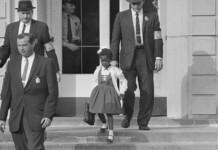Happy 85th Birthday to Osage-American travel writer William Least Heat-Moon. His debut novel, Blue Highways, (1982) is a chronicle of a three-month-long road trip that Least Heat-Moon took throughout the United States in 1978 after he had lost his teaching job and been separated from his first wife. He tells how he traveled 13,000 miles, as much as possible on secondary roads, and tried to avoid cities. His second work was River-Horse during which he traveled across the US entirely on waterways. READ more about what he encountered… (1939)
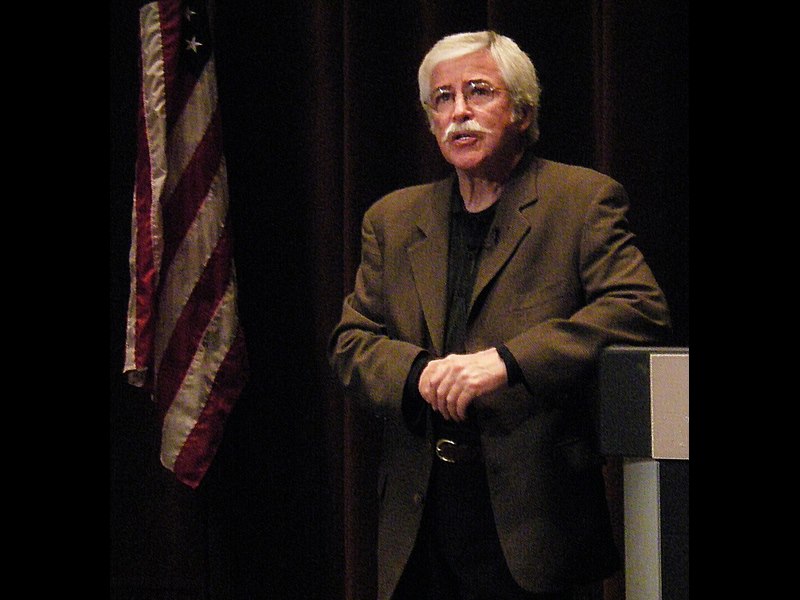
In Blue Highways, the author refers to roads that were often drawn on maps in blue in the old-style Rand McNally road atlas, hence the book title. Living out of his van, he visited small towns such as Nameless, Tennessee; Hachita, New Mexico; and Bagley, Minnesota, to find places in America untouched by fast food chains and interstate highways. The book records his search for something greater than himself and includes memorable encounters in roadside cafés. This memoir was very popular, making the New York Times bestseller list in 1982–83 for 42 weeks.
During this nearly 5,000-mile journey for River-Horse, he followed documented routes recorded by early explorers such as Henry Hudson and the Lewis and Clark expedition.
Least Heat-Moon’s writings present a critique of how societal progress has negatively affected the ecosystem. However, he also attempts to illustrate a hybrid relationship between humans and the environment and how each entity influences the other. Blue Highways has been likened to a cross between John Steinbeck’s Travels with Charley, and Jack Kerouac’s On the Road.
He has said that both were an inspiration to him.
MORE Good News on this Day:
- Radio Argentina first broadcast a live show from a theater in Buenos Aires, one of the first live radio transmissions in the world. (1920)
- The first jet aircraft flew, the Heinkel He 178, piloted by Erich Warsitz and powered solely by turbojets (1939)
- Negotiations between West Germany and Israel over reparations for Nazi atrocities ended in Luxembourg, with the European country agreeing to pay 3 billion Deutschmarks (1952)
- Moldova declared independence from the USSR (1991)
- Sen. Barack Obama, a senator from Illinois, became the first-ever black American nominated for president by a major party at its national convention (2008)
71 years ago today, the Hollywood film Roman Holiday was released. Shot at iconic locations all around Rome, the romantic comedy by Dalton Trumbo stars Gregory Peck as a reporter and (the relatively unknown) Audrey Hepburn as a royal princess who snuck out from her boring state duties to explore the Eternal City of Rome on her own. The film represented the early explosion of “Hollywood on the Tiber,” a film trend where Rome became an international filming hotspot.

From among 8 Oscar nominations, Hepburn won the Academy Award for Best Actress—and Trumbo’s screenplay and the costume designer also won. Roman Holiday created a boon for international sales of Vespa scooters, previously only popular in Italy, after they were featured throughout the film.
Roman Holiday was selected for the Library of Congress as a culturally important film in American history, and has been called a “timeless classic” a “modern fairy tale,” and “one of only a few black-and-white movies that modern audiences willingly watch. WATCH the trailer… (1953)
69 years ago today, the first-ever edition of the Guinness Book of World Records was published. The brainchild of a South African businessman and engineer, the book was a hit in England by Christmas. Today, the rise of digital media has seen the book become simply the Guinness World Records, but the yearly edition is still published—now in 100 countries and 23 languages. 53,000 records exist in their archives.
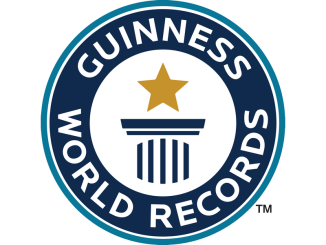
The idea for a book of records began in the early 1950s when Sir Hugh Beaver (1890—1967), Managing Director of the Guinness Brewery, attended a shooting party in County Wexford. There, he and his hosts argue about the fastest game bird in Europe, and fail to find an answer in any reference book.
In 1954, recalling his shooting party argument, Sir Hugh has the idea for a Guinness promotion based on the idea of settling pub arguments and invites the twins Norris (1925—2004) and Ross McWhirter (1925—75) to compile a book of facts and figures. (1955)
33 years ago today, Pearl Jam released their debut album Ten, which catapulted the new genre of ‘grunge rock’ into mainstream success.

With layered harmonics and lyrics by the group’s singer-songwriter Eddie Vedder, the LP produced three hit singles—Alive, Even Flow, and Jeremy.
The Seattle band reached No.2 on the Billboard album chart with their most commercially successful LP—certified 13× Platinum with over 13 million copies sold. READ the GNN stories sharing Pearl Jam good news, and WATCH David Letterman induct the band into the Rock & Roll Hall of Fame… (1991)
95 years ago today, the Kellogg-Briand Pact—or Pact of Paris, named for where it was signed—united 60 countries under an international treaty “providing for the renunciation of war as an instrument of national policy.”
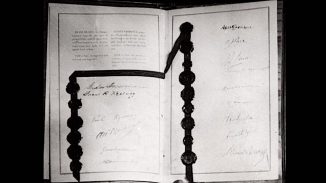
Though it ultimately failed to stop wars, the pact was significant for its influence on later international law. It was named after the American secretary of state, Frank B. Kellogg, and French Foreign minister, Aristide Briand, who together drafted the pact. (1929)
Also, 359 years ago today, the first American play was performed at Fowkes Tavern in Accomack County on Virginia’s Eastern Shore. Entitled Ye Bare and Ye Cubb, it was the first time a play was produced in the English colonies in North America.
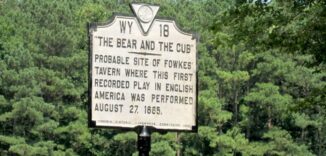
No copy of the play survives, but alongside Route 13 is posted a Virginia Historical Highway Marker that reads, “Probable Site of Fowkes Tavern, where the first play in English America ‘Ye Bare and Ye Cubb,’ was performed on August 27, 1665.”
Possibly because it was performed on the Sabbath, the play ended up in court, charged with being blasphemous and profane by some offended critic. The second performance of the show actually took place in court, which also convened in Fowkes Tavern, when the judge demanded to see it. After watching the play, which was likely the invention of the three offending presenters—Cornelius Watkinson, Philip Howard, and William Darby—the judge threw out the case, fined the critic for frivolous waste of the court’s time, and declared that the show was not blasphemous, but rather “entertaining”. (1665)
SHARE the Milestones, Memories, Movies, and Music…


